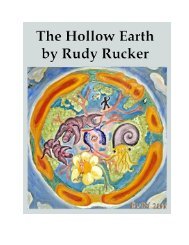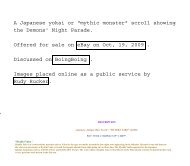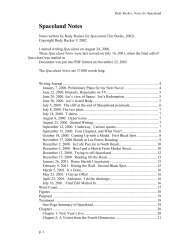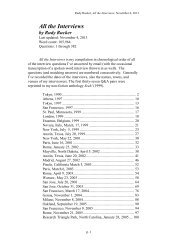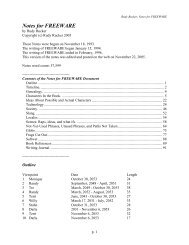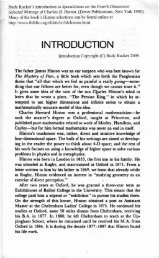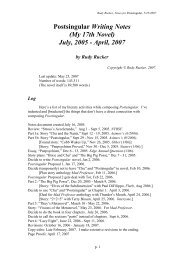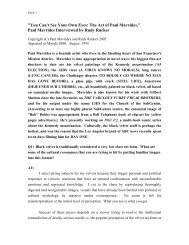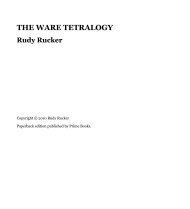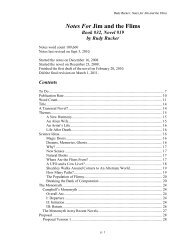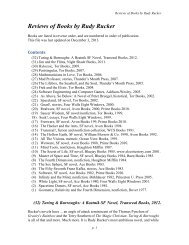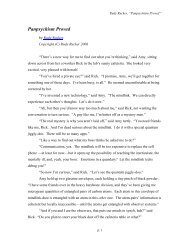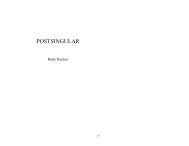Notes for the Lifebox, the Seashell, and the Soul - Rudy Rucker
Notes for the Lifebox, the Seashell, and the Soul - Rudy Rucker
Notes for the Lifebox, the Seashell, and the Soul - Rudy Rucker
Create successful ePaper yourself
Turn your PDF publications into a flip-book with our unique Google optimized e-Paper software.
<strong>Notes</strong> <strong>for</strong> The <strong>Lifebox</strong>, <strong>the</strong> <strong>Seashell</strong>, <strong>and</strong> <strong>the</strong> <strong>Soul</strong>, by <strong>Rudy</strong> <strong>Rucker</strong><br />
though. The idea is base a line of thought on my Leuven lecture notes, On Computation<br />
<strong>and</strong> on “The Missing Mind,” <strong>the</strong> paper-in-progress I’m ever-so-slowly writing with my<br />
Leuven philosopher hosts Mark van Atten <strong>and</strong> Leon Horsten. I’m getting exceedingly little<br />
input from <strong>the</strong> boys, maybe 5% of <strong>the</strong> paper, so I feel it would be okay to use it as my own.<br />
The pay-off in <strong>the</strong> paper is based on Nick Herbert’s little essay “Quantum Tantra.” I do need<br />
to see if Nick minds if I use his idea. Conceivably I could collaborate with him, but that<br />
would be more work I think.<br />
(Thesis) Upon introspection we feel <strong>the</strong>re is a residue that isn’t captured by any<br />
scientific system; we feel ourselves to be quite unlike machines. This is <strong>the</strong> sense of having a<br />
soul.<br />
(Anti<strong>the</strong>sis) But (a) <strong>the</strong> work in AI <strong>and</strong> simulations, (b) genetic algorithms, <strong>and</strong> (c)<br />
simple considerations of degrees of computability seem to indicate that any clearly described<br />
human behavior can be emulated by a machine. Where is, <strong>the</strong>n, <strong>the</strong> missing soul?<br />
(Syn<strong>the</strong>sis) The “soul” can be given a scientific meaning as one’s immediate<br />
perception of one’s uncollapsed wave function, particularly as it is entangled with <strong>the</strong><br />
uncollapsed universal wave function of <strong>the</strong> cosmos.<br />
(Two possible conclusions) Ei<strong>the</strong>r (a) machines, qua physical objects, have<br />
uncollapsed wave functions as well, so <strong>the</strong>y too have <strong>the</strong> same kind of “soul” that we have or<br />
(b) <strong>the</strong>re is something so far unique about how we manage to couple our soul experiences<br />
with our logical reasoning. Re (b) it would be worth looking into quantum computation as<br />
currently <strong>for</strong>mulated.<br />
In o<strong>the</strong>r words it’s time to play some catch-up ball re. quantum computation. Well,<br />
right now I have tons of time, so why not read up on Quantum Mechanics again. I found my<br />
nice old intro by Daniel T. Gillespie A Quantum Mechanics Primer. I bought it at Rutgers<br />
<strong>and</strong> read it in Geneseo. On <strong>the</strong> back pages were written a couple of drafts of 1976 poems,<br />
from Geneseo days, “Drunken Hearted Man,” <strong>and</strong> “She Got a Phonograph.” I also bought a<br />
new book on Quantum Computation <strong>and</strong> Quantum In<strong>for</strong>mation.<br />
I finished reading <strong>the</strong> Primer on <strong>the</strong> beach at 14th Ave. in Santa Cruz yesterday. It<br />
was so lovely, <strong>the</strong>re, lying beneath <strong>the</strong> tall Monterey pines, with <strong>the</strong> long luscious crunches<br />
of <strong>the</strong> clean green waves running a hundred meters parallel to <strong>the</strong> beach.<br />
More <strong>and</strong> more I’m fascinated by <strong>the</strong> idea that my state of mind is exactly like a<br />
quantum state, a wave function me that is a complex-valued function over an n-dimensional<br />
space with n quite a large number describing my degrees of freedom (<strong>the</strong> log of my number<br />
of mental states?) If A <strong>and</strong> B are observables, this means <strong>the</strong>y are questions you might ask<br />
me. If A has answers a1 <strong>and</strong> a2 <strong>and</strong> B has answers b1 b2 b3, <strong>the</strong>n <strong>the</strong>re are corresponding<br />
eigenstates Ai, Bj. When I am in eigenstate A1 I <strong>for</strong> sure believe <strong>the</strong> answer is a1. But<br />
normally I’m, like, 0.7exp(iu1) A1 + 0.7exp(iu2) A2. I’ll go into this at greater length<br />
outside <strong>the</strong> journal notes, it’s too mathy <strong>and</strong> too preliminary <strong>for</strong> this venue.<br />
June 11, 2003. Discover Memoir <strong>Notes</strong> Once Again.<br />
I remembered that at Esalen I flashed on this a book idea: Memoirs of a Crazy<br />
Ma<strong>the</strong>matician. And <strong>the</strong>n I once again stumbled onto <strong>the</strong> Memoir <strong>Notes</strong> document I’d made<br />
in April <strong>and</strong> <strong>for</strong>gotten once be<strong>for</strong>e. I only found it because while spell-checking I noticed I’d<br />
made a dictionary file called “memoir.dic” <strong>and</strong> I’m all, huh? My mind is like a sieve, maybe<br />
<strong>the</strong> sooner I do memoirs <strong>the</strong> better. I’m gonna integrate <strong>the</strong> Memoirs notes into this<br />
document.<br />
p. 114



